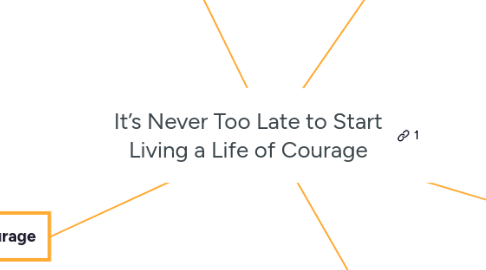
1. Courage is Beneficial
1.1. Courage makes you feel good
1.1.1. Helps you appropriately respond to risk and accomplish positive things
1.1.2. Helps you to act when under threat
1.2. Learn to master your emotions
1.3. Act despite the risks and fear you face
2. Overcome Fear With Courage
2.1. Fear is necessary for survival
2.2. Play a game of questions:
2.2.1. What’s the worst that could happen?
2.2.2. What is it that I’m afraid of?
2.2.3. Am I afraid of something I should be afraid of?
2.2.4. Is my fear rational?
2.2.5. What harm does this threat or risk present to me?
2.2.6. If I choose not to act, what could happen?
2.2.7. If I choose to act, what could happen?
2.2.8. What’s the worst-case scenario if I do or don’t act in this situation?
2.2.9. What risk does this pose to me?
2.2.10. What risk does this pose to others?
2.3. Confidence is a positive trait. It gives you the power to:
2.3.1. Act
2.3.2. Believe in yourself
2.3.3. Chase your convictions
2.4. If you’re worried that you have an over-confidence problem, then ask yourself:
2.4.1. What can you achieve?
2.4.2. How can you make a difference?
2.4.3. How can you be sure that your actions will have an impact?
2.4.4. How can you be sure that you’re not doing harm?
3. Developing Courage
3.1. Do:
3.1.1. Identify the Fear
3.1.2. Determine the Cause
3.1.3. Recognize Courage
3.1.4. Develop a Plan
3.1.5. Script Situations
3.1.6. Keep it Simple
3.1.7. Embrace the Positive
3.1.8. Accept Failure, Take Risks
3.1.9. The Road Less Taken
3.2. Don't
3.2.1. Make Comparisons
